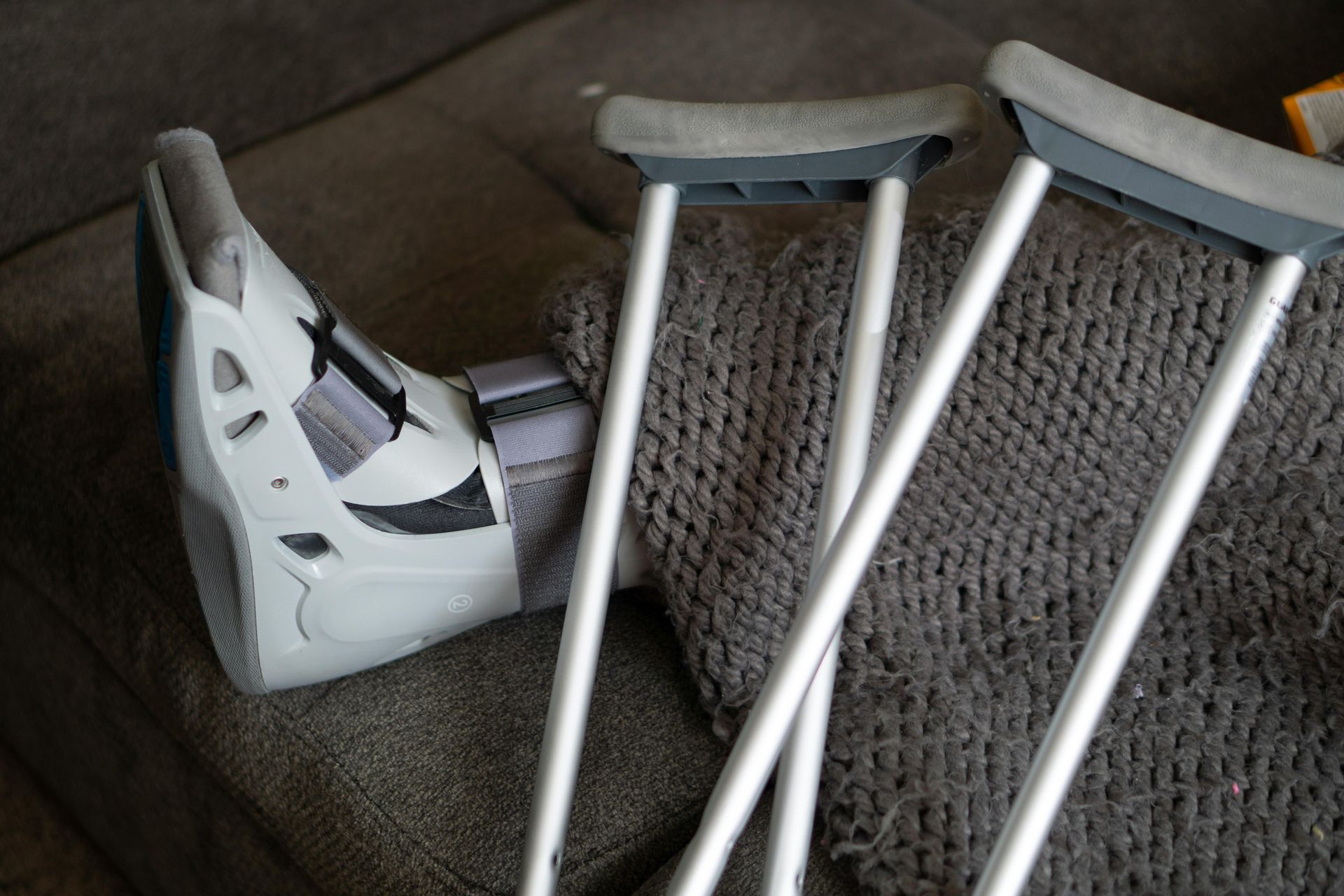April 10, 2025
Orlando is a vibrant city, bustling with activity. You might be shopping at the mall, dining at a restaurant, staying at a hotel, visiting an attraction, or simply walking through a parking lot. The last thing you expect is for your day to be shattered by a sudden slip and fall accident. One moment you're upright, the next you're on the ground, experiencing shock, pain, potential embarrassment, and the terrifying realization that you might be seriously injured. Slip and fall accidents on commercial properties are unfortunately common. Wet floors, uneven surfaces, poor lighting, unexpected obstacles, or inadequate maintenance can turn a routine outing into a nightmare. While your immediate concern is rightfully your health, the actions you take in the minutes and hours immediately following the fall are absolutely critical for both your physical recovery and protecting your legal rights. Evidence disappears quickly, memories fade, and crucial details can be lost. Making the right moves from the start can make all the difference in your ability to hold a negligent property owner accountable. Knowing what to do can be overwhelming, especially when you're injured and shaken. At Lett Law Firm , we understand. Ariel Lett, ESQ. , our Founding Attorney, is one of Orlando, Florida's Top and Award-Winning Personal Injury Lawyers . We've dedicated our practice to fighting for the injured, helping them navigate the complex aftermath of accidents caused by negligence. We believe strongly that you should Get The Justice That You Deserve , and that starts with knowing how to protect yourself immediately after a slip and fall. This guide provides clear, step-by-step instructions on what you need to do right after a slip and fall accident on commercial property here in Orlando. 1. Prioritize Your Health: Seek Immediate Medical Attention This is your absolute top priority. Nothing is more important than your health and well-being. Assess Injuries Before Moving: If you can, take a moment before trying to get up. Check for obvious injuries, pain, numbness, or dizziness. Moving improperly could worsen certain injuries, especially to the back, neck, or head. If you are unsure or in severe pain, stay put and wait for help. Call 911 or Seek Emergency Care: Don't hesitate to call for emergency medical assistance if you are seriously hurt, hit your head, lost consciousness even briefly, suspect broken bones, or are in significant pain. If your injuries seem less severe, you should still seek prompt medical evaluation at an emergency room or urgent care center as soon as possible , ideally the same day. Explain the Fall: When you see medical professionals, clearly explain that you were injured in a slip and fall accident and describe how it happened (e.g., "I slipped on a wet spot in the grocery aisle," "I tripped on a cracked sidewalk outside the restaurant"). Why Immediate Care is Crucial (for Health & Legal Reasons): Health: Some serious injuries, like traumatic brain injuries (TBIs), internal bleeding, or soft tissue damage (sprains, strains, tears), may not have immediately obvious symptoms. Delaying treatment can worsen your condition. Legal: Seeking immediate medical attention creates a vital record linking your injuries directly to the fall incident. Insurance companies often argue that if you didn't seek medical care right away, your injuries must not be serious or must have been caused by something else later. Prompt treatment counters these arguments. 2. Document the Scene: Evidence Disappears Fast! If you are physically able, or if someone with you can assist, gathering evidence at the scene before conditions change is incredibly important. Commercial properties often clean up spills or repair hazards quickly after an incident occurs. Identify the Exact Cause: Pinpoint precisely what made you fall. Was it a puddle of water? Leaked refrigerant? Spilled food or drink? A recently mopped floor with no warning sign? Uneven pavement? A pothole? Poor lighting obscuring a hazard? A rolled-up mat? Debris on the floor? Be as specific as possible. Take Photos and Videos: Use your smartphone immediately. Capture extensive photographic and video evidence of: The specific hazard that caused your fall (get close-ups and wider shots). The surrounding area , showing the location within the property. Any lack of warning signs (or signs that were inadequate or poorly placed). Lighting conditions if relevant (e.g., dimly lit stairwell). Any visible injuries you sustained (bruises, cuts). Your clothing and footwear , especially if they were damaged or wet. Take more photos and videos than you think you need, from various angles and distances. Timestamped photos/videos are powerful evidence. Look for Witnesses: Were there other customers, employees, or bystanders who saw you fall? Did anyone see the hazardous condition before your fall? Politely ask for their names and contact information (phone number and email address). Independent witness testimony can be invaluable in proving the property owner knew or should have known about the danger. Preserve Your Footwear and Clothing: The shoes and clothes you were wearing at the time of the fall are physical evidence. Do not wash them or clean them immediately. They might hold residue from the substance you slipped on, or tears/damage might indicate the force of the fall. Set them aside in a safe place. 3. Report the Incident Officially to Management You must notify the property owner or manager about the accident before you leave the premises. Inform the Person in Charge: Speak directly to the store manager, restaurant owner, property manager, security guard, or supervisor on duty. Calmly and clearly state that you fell and were injured due to a specific condition on their property. Request an Incident Report: Ask them to formally document the incident by creating an official incident or accident report. Most commercial establishments have procedures for this. Provide Factual Information: Stick to the facts when providing information for the report: your name, contact information, the date, time, and precise location of the fall, a brief description of what happened (e.g., "slipped on clear liquid near aisle 5"), and the names of any witnesses you identified. Avoid Speculation or Minimizing: Do not speculate about who was at fault. Do not apologize. Importantly, do not minimize your injuries – avoid saying "I'm okay" or "I don't think I'm hurt." State clearly that you are injured and are seeking/will be seeking medical attention. Get Proof of the Report: Ask for a copy of the completed incident report before you leave. If they refuse to provide a copy, make sure you get the full name and title of the person you spoke with and note the date and time you made the report. Consider sending a follow-up email or certified letter to the business summarizing your report of the incident as further proof. Do NOT Sign Their Report (Usually): Be very wary of signing any incident report they prepare, especially if you disagree with any part of it, feel pressured, or don't fully understand it. You are generally not required to sign their internal report. 4. Critical Mistakes to AVOID Immediately After a Fall Just as important as knowing what to do is knowing what not to do: DON'T Refuse Medical Attention or Delay Treatment: This is the biggest mistake. It harms your health and your potential claim. DON'T Apologize or Admit Fault: Saying "I'm sorry" or "I wasn't looking" can be misinterpreted as admitting you were responsible, even if you weren't. DON'T Give a Recorded Statement to Their Insurance Company: The property owner's insurance adjuster may contact you quickly. They are not on your side. Politely decline to give a recorded statement until you have consulted with an experienced personal injury lawyer. Their goal is to find reasons to deny or minimize your claim. DON'T Sign Any Documents Without Legal Review: Never sign any waivers, releases, or settlement offers from the property owner or their insurer without having an attorney review them first. You could unknowingly sign away your rights. DON'T Post About the Incident on Social Media: Insurance companies routinely scour social media profiles for photos, videos, or comments that could contradict your injury claims (e.g., photos of you engaging in activities inconsistent with your reported injuries). Keep your situation private online. Understanding Premises Liability in Orlando, Florida To successfully pursue a slip and fall claim, you generally need to prove negligence on the part of the commercial property owner or operator. Under Florida law, property owners owe a duty of care to lawful visitors (like customers, known as "invitees") to maintain their premises in a reasonably safe condition. This includes: Regularly inspecting the property for potential hazards. Repairing dangerous conditions in a timely manner. Warning visitors of hazards that cannot be immediately fixed. To win your case, your attorney typically needs to establish: The property owner owed you a duty of care. The property owner breached that duty (failed to act reasonably). This breach caused your fall and resulting injuries. You suffered actual damages (medical bills, lost wages, pain and suffering, etc.). Florida Statute 768.0755 specifically addresses slip and falls caused by "transitory foreign substances" (like spills). This law requires the injured person to prove that the business establishment had actual or constructive knowledge of the dangerous condition and should have taken action to remedy it. Constructive knowledge can be shown if the condition existed for such a length of time that the business should have known about it through reasonable care, or if the condition occurred regularly and was therefore foreseeable. This highlights why documenting the scene immediately (photos of the spill, witness accounts of how long it was there) is so vital. Why You Need Lett Law Firm On Your Side Immediately Premises liability cases are complex. Commercial property owners and their large insurance companies have significant resources and legal teams dedicated to fighting claims. Trying to navigate this alone while recovering from injuries is incredibly difficult and puts you at a severe disadvantage. This is where Lett Law Firm steps in. As a top, award-winning Orlando personal injury firm, we have the experience, resources, and tenacity to fight for you. Ariel Lett, ESQ. and his team understand Florida's premises liability laws inside and out. When you contact us immediately after your fall, we can: Act Quickly to Preserve Evidence: Launch an immediate investigation, potentially securing crucial evidence like store surveillance footage (which is often erased quickly), maintenance logs, and formally interviewing witnesses. Handle All Communications: Take over all communication with the property owner and their insurance company, protecting you from saying anything detrimental. Establish Liability: Utilize the evidence gathered and our legal expertise to build a strong case proving the property owner's negligence under Florida law. Calculate Your Full Damages: Work with medical experts and economists, if needed, to determine the full extent of your injuries and financial losses, including future medical needs and lost earning capacity. Negotiate Aggressively: Fight for a fair settlement that fully compensates you for your losses. Litigate If Necessary: Prepare and file a lawsuit and take your case to court if the insurance company refuses to offer a just settlement. We are committed to ensuring that negligent property owners are held accountable so that our clients can Get The Justice That You Deserve. Take Control From Moment One A slip and fall accident on commercial property in Orlando can happen instantly, but the consequences can last a lifetime. The immediate actions you take – prioritizing medical care, documenting the hazard and scene, reporting the incident officially, and avoiding common mistakes – are crucial for protecting both your physical health and your legal right to compensation. These steps lay the essential groundwork for holding the negligent property owner responsible. Don't let crucial evidence disappear or jeopardize your claim through inaction or errors. Take control by following these guidelines, and most importantly, seek expert legal guidance without delay. If you or a loved one has been injured in a slip and fall accident on commercial property in Orlando or the surrounding areas, contact Lett Law Firm immediately . Schedule a free, no-obligation consultation with Ariel Lett, ESQ. and our dedicated team. Let us put our award-winning experience to work for you. Call Lett Law Firm today – Get The Justice That You Deserve! Disclaimer: This blog post is intended for informational purposes only and does not constitute legal advice or create an attorney-client relationship. Slip and fall laws in Florida are complex and fact-specific. You should consult with a qualified Florida personal injury attorney regarding your particular situation. Contact Lett Law Firm for personalized legal counsel.











